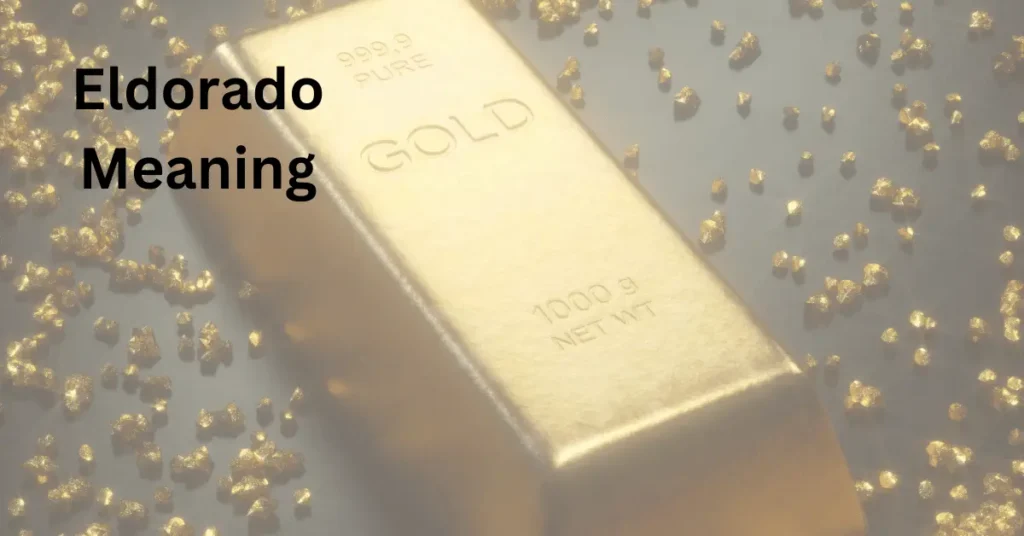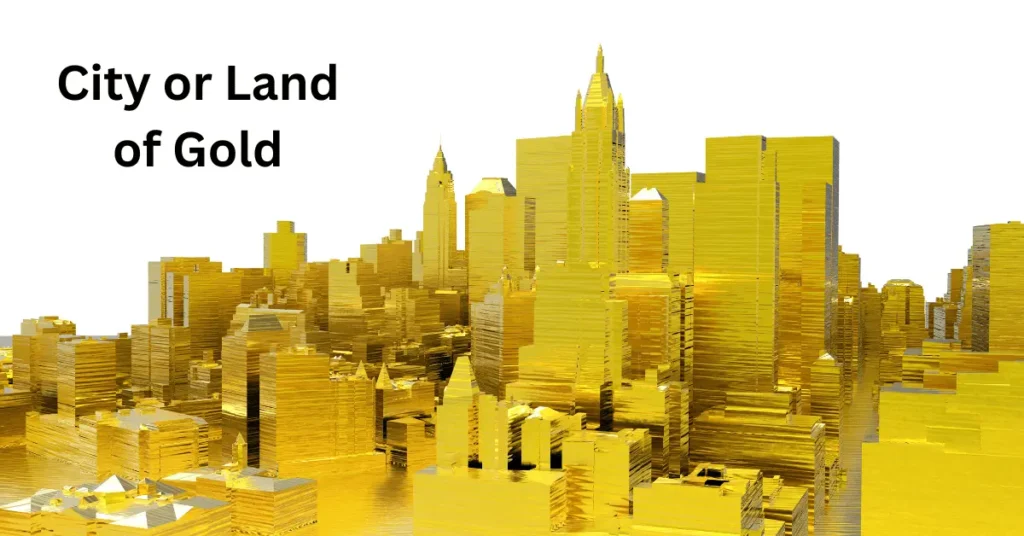Eldorado Meaning

Have you ever heard the term “Eldorado” and wondered what Eldorado Meaning? It’s a word that often pops up when we talk about treasure hunts, myths, and the pursuit of wealth.
But “Eldorado” isn’t just about gold—it represents something bigger: a place or opportunity filled with incredible wealth, success, or potential.
In this article, we’ll dive into the Eldorado meaning, explore its fascinating history, and look at how this legendary term continues to inspire people even today.
So, let’s take a journey into the world of Eldorado!
What Does “Eldorado” Mean?
The word “Eldorado” carries a rich and powerful meaning, rooted in both legend and modern symbolism.
In its simplest form, Eldorado refers to a place of fabulous wealth, often imagined as a city or land overflowing with gold and treasure.
It’s derived from the Spanish term el dorado, which translates to “the golden one” or “the gilded one.”
This phrase was used to describe a legendary figure, often believed to be a king, who was said to cover himself in gold dust and rule over an incredibly prosperous kingdom.
Over time, the meaning of Eldorado expanded beyond just a physical place.
While it originally symbolized a literal city of gold, it eventually became a metaphor for any opportunity or pursuit that promises great wealth, success, or fulfillment.
It could be used to describe a job opportunity, a business venture, or even a personal goal that seems to offer extraordinary rewards or benefits.
In essence, Eldorado represents the ideal of unattainable success or fortune—a treasure trove that people dream of reaching, but often find elusive or difficult to achieve.
It carries an element of excitement, hope, and the thrill of discovery, making it a symbol of the endless human quest for prosperity and happiness.
Definition of Eldorado Meaning
Eldorado is a term that originally referred to a mythical city of gold, but over time, its meaning has evolved into something broader and more symbolic. It refers to:
A place of immense wealth or opportunity, often imagined as a hidden or untapped source of great riches.
- A metaphorical pursuit—a dream or goal that promises great rewards, whether in terms of material wealth, personal success, or fulfillment.
- An idealized destination—a place or state that represents ultimate success, but one that is often hard to attain or elusive.
In modern usage, “Eldorado” is no longer just tied to gold or treasure. It symbolizes the perfect situation or opportunity that promises great fortune, whether it’s financial, emotional, or otherwise.
However, just like the mythical city itself, Eldorado remains somewhat out of reach, often considered more of a dream than a concrete reality.
Examples of Eldorado Meaning
Historical Example
During the age of Spanish exploration in South America, Eldorado was believed to be a city of gold located somewhere deep in the Andes.
Explorers like Francisco Orellana and Gonzalo Pizarro embarked on dangerous expeditions in hopes of discovering this legendary place.
While they never found the city, their search for Eldorado is a perfect example of the term as a literal place filled with unimaginable wealth.
Modern Example in Business
Imagine you’re an entrepreneur, and you’ve discovered a new market with a product that promises to revolutionize the industry.
This market feels like your “Eldorado”—an opportunity filled with boundless potential and financial rewards.
It represents the ideal chance to succeed, but achieving that success may require a great deal of effort and risk, just like the search for the mythical city of gold.
Cultural Example
In the world of sports, a professional athlete might view a championship title as their Eldorado. It’s the ultimate prize that symbolizes years of hard work, dedication, and sacrifice.
Although it’s a dream many athletes strive for, it’s often difficult to reach and may seem unattainable for many.
Personal Example
For some people, Eldorado could represent the dream of achieving work-life balance. Picture someone working tirelessly toward the goal of having a fulfilling career while spending quality time with family and friends.
It’s a perfect situation that seems ideal and rewarding, but one that many find difficult to achieve, much like a distant treasure waiting to be discovered.
These examples show that Eldorado doesn’t just refer to one thing—it represents any quest for something of great value.
Whether it’s treasure, success, or happiness, the idea of Eldorado continues to inspire and drive people in their pursuits, just as it did centuries ago for explorers and adventurers.
Word Origin of Eldorado

The word Eldorado has fascinating origins that trace back to the age of exploration in South America during the 16th century. Let’s break it down:
Spanish Roots
The term Eldorado comes from the Spanish phrase el dorado, which literally translates to “the golden one.”
The word dorado itself is derived from the Spanish verb dorar, meaning “to gild” or “to cover with gold.”
The term initially referred to a legendary figure, often described as a king or ruler who was said to cover himself with gold dust, symbolizing immense wealth and power.
Over time, this figure became associated with a mythical city that was believed to be filled with gold.
The Myth’s Creation
During the early 1500s, Spanish explorers began hearing tales from the indigenous peoples of the Andes and the Amazon about a wealthy kingdom or ruler.
According to these stories, the ruler would cover himself in gold dust as part of a ceremonial ritual.
This king, or sometimes the entire kingdom, was referred to as El Dorado—the “Golden One.”
The Search for El Dorado
As rumors of this golden king spread, Spanish adventurers and explorers, fueled by greed and the desire for wealth, embarked on dangerous journeys into the heart of South America in search of this elusive city.
The most famous of these expeditions was led by Gonzalo Pizarro, one of the conquistadors who had helped conquer the Inca Empire.
Pizarro and other explorers spent years searching for the fabled city, but despite their efforts, no evidence of El Dorado was ever found.
Evolution of the Term
Though the city of gold was never discovered, the myth of Eldorado evolved over time.
By the 17th century, El Dorado came to represent not just a place of gold, but any unattainable source of great wealth and success.
The term grew beyond its literal meaning to describe any idealized pursuit or opportunity that seemed to promise extraordinary riches, even if it was out of reach.
Eventually, it began to symbolize more than just material wealth, encompassing success in general.
Modern Usage
Today, Eldorado is used metaphorically in various contexts to refer to any pursuit or opportunity that holds great potential, whether it’s a business venture, a personal goal, or a dream of success.
The term has become so ingrained in popular culture that it’s often used to describe any perfect place or ideal situation, even outside of the context of gold or riches.
In summary, the word Eldorado has its roots in the Spanish el dorado, meaning “the golden one.”
It originated from myths surrounding a gold-covered king and a hidden city of gold in South America, and over time, it evolved into a broader metaphor for any unattainable dream or opportunity filled with great wealth or success.
FAQs
What is the meaning of “Eldorado”?
The term “Eldorado” refers to a mythical place that is thought to contain immense wealth, often gold. Originally, it described a legendary city or kingdom in South America believed to be filled with treasures. Over time, the term evolved to represent any opportunity, place, or pursuit that promises great wealth, success, or fulfillment, though it is often elusive and difficult to attain.
Is Eldorado a real place?
No, Eldorado is not a real, physical place. The idea of Eldorado began as a myth during the 16th century when Spanish explorers believed there was a city filled with gold somewhere in South America. Despite numerous expeditions to find this city, it was never discovered, and Eldorado remains a legend and a symbol of unattainable riches.
Where did the myth of Eldorado come from?
The myth of Eldorado originated during the Spanish conquest of South America. Spanish explorers, such as Francisco Orellana and Gonzalo Pizarro, heard stories from indigenous peoples about a king who covered himself in gold dust and ruled over a wealthy kingdom. Over time, this myth evolved into the story of a city of gold, and the search for Eldorado became one of the most famous quests in history.
Why is Eldorado important in modern culture?
Today, Eldorado symbolizes more than just a literal city of gold. It has come to represent the pursuit of an idealized goal—whether it’s financial success, personal achievement, or happiness. The idea of Eldorado continues to inspire people as a metaphor for dreams, ambitions, and the search for extraordinary opportunities, even if they seem difficult to reach or too good to be true.
How is Eldorado used in literature or media?
Eldorado appears frequently in literature and media, often as a symbol of an unattainable goal or a warning against the dangers of obsession with wealth. Famous works like Edgar Allan Poe’s poem “Eldorado” explore the concept of a quest for something that may never be found. Eldorado has also been featured in movies, books, and video games, often representing the pursuit of treasure or ultimate success.
Conclusion
In summary, the meaning of Eldorado has evolved from a mythical city of gold to a powerful symbol of wealth, success, and the pursuit of dreams.
While the literal city was never found, the idea of Eldorado continues to inspire people worldwide, representing an idealized goal or opportunity that promises great rewards.
Whether in history, business, or personal life, the search for Eldorado reminds us of the human desire for success and the thrill of chasing after something extraordinary—even if it seems just out of reach.
Extra Points on Eldorado
- The Legacy of Exploration: The search for Eldorado led to many exciting and dangerous expeditions in South America, contributing to the exploration of new territories. Though the city of gold was never found, these journeys helped map uncharted regions.
- A Symbol of Hope and Ambition: Eldorado represents more than just gold—it’s about the dreams and ambitions people chase. Whether it’s financial success, personal growth, or achieving a long-term goal, Eldorado inspires us to reach for something greater.
- A Cautionary Tale: The myth of Eldorado also serves as a reminder of the dangers of obsession. Many explorers became so fixated on finding Eldorado that they risked their lives. It shows how chasing after an unattainable goal can sometimes lead to disappointment or even destruction.
- Influence on Pop Culture: The concept of Eldorado has inspired countless books, movies, and songs. It’s often used to represent the ultimate quest for something valuable, whether it’s wealth, success, or happiness.
- Endless Inspiration: Even though the physical city of gold doesn’t exist, the idea of Eldorado continues to fuel our imaginations and encourage us to dream big. It reminds us that while the journey may be tough, the pursuit of our goals can lead to exciting discoveries along the way.